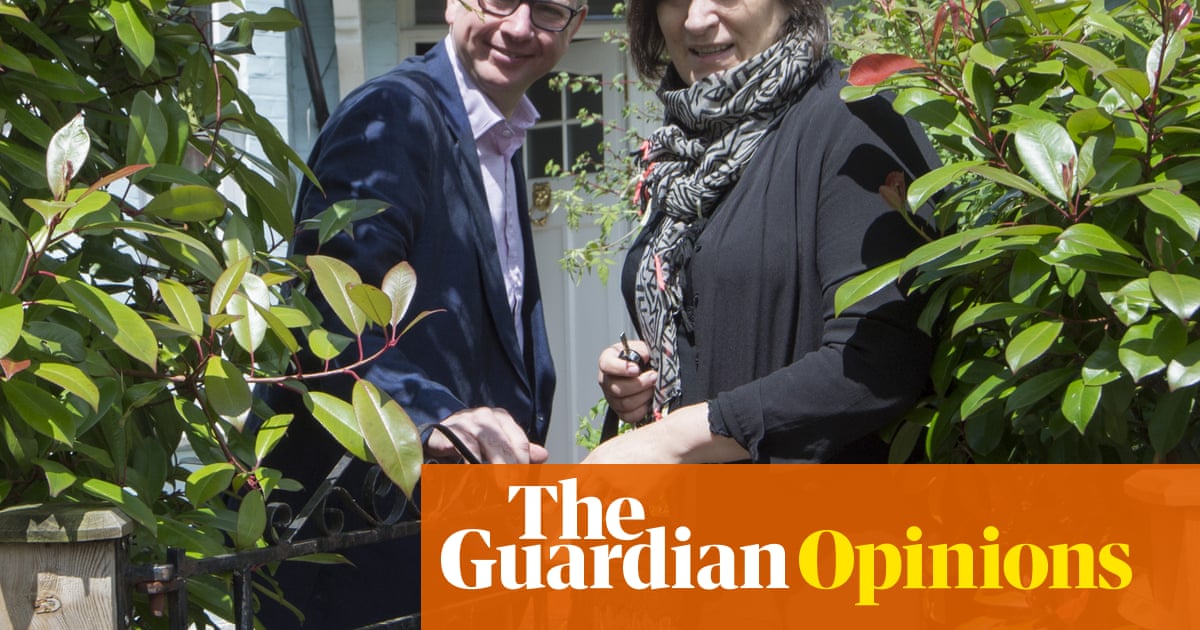The intrusion of politics into personal relationships has been an eagerly documented feature of the Trump-Brexit era, which this week found its perfect expression: a granular account of the end of the marriage between Sarah Vine andMichael Gove. You may think, as I did, you’re not interested in this, but hold up. A recent excerpt in the Daily Mail from How Not to Be a Political Wife, Vine’s forthcoming memoir, contained not only the suggestion that Brexit ruined their marriage, but that a key trigger in its collapse was Andrea Leadsom’s political manoeuvring. Has Andrea Leadsom ruined any of your relationships? It is certainly a question worth asking.
Or more broadly: do people really break up with each other because of big-P politics? In the case of Vine/Gove – which sounds like a tortured play at the National that, despite the playwright’s best hopes, never transferred to the screen – it’s a complicated picture. This wasn’t a separation brought on by opposing views about Europe, but rather, in Vine’s account, by the stress caused when her husband backedBrexitand drove a wedge between the couple and their pro-European friends and colleagues. Brexit broke their marriage but only because it put in motion a train of events that ended in David Cameron standing down, Leadsom scuppering Boris Johnson’s first run for top office, Theresa May becoming prime minister, and, ultimately, Gove losing his cabinet position.
This isn’t how most of us experience politics, which is to say with a sense of immediate, personal jeopardy. Still, when Vine writes “politics had infected every aspect of our lives – and it caused untold damage”, refers to “BB (Before Brexit) friends” and suggests huffily “I don’t know Andrea Leadsom and have nothing against her, so I’m not 100% sure why she effectively became the touchpaper by which Michael set fire to the Boris leadership campaign and thereby, eventually, to our lives together”, you get the gist of a household in which conflict organised itself around a single political moment.
This is recognisable. I’ve just read Elizabeth Strout’s latest novel,Tell Me Everything, in which, returning to her usual setting in Maine, she suggests it is entirely possible to sit on a bench in the sun and chat pleasantly to a friend who voted for Trump, except when that friend meets a man online who deepens her delusions about immigrants and how food banks are exploited by people too lazy to work – and then friendship across the divide doesn’t work. When the novelists give up, you have to worry.
In reality, of course, the political issues that have caused the most friendship breaks recently have been neither Trump nor Brexit, two causes so clearly defined between left and right that few of those from one camp were pre-existing friends with the other, but rather Israel/Palestine and gender. I was just in New York, where a friend said with something like shellshock that half her social group isn’t speaking to the other because of opposing views on the Middle East. In these fights between friends, every shred of evidence is marshalled against one another so that “we disagree on this subject” becomes “she was always like this”, before advancing, inevitably, to “she’s a lunatic”. Some political disputes are just that, of course, while others ennoble a personal beef that’s been going in the friendship for some time.
Anyway, back toVine and her memoir, to which we come for the political gossip and stay for the kabuki-style prose, in which Vine toggles between a what-are-men-like eye-roll and a seemingly genuine loathing for her ex-husband. “Michael had repeatedly told the nation that he’d never run for leadership,” she writes at one point, suggesting a relationship between Gove and “the nation” that might come as news to the nation.
Mostly it provides us with insight into the weirdness of other people’s marriages, a worthy distraction in these fraught times. “I think better when I’ve written things down,” recalls Vine, “so, before Michael was up that Monday, I wrote an email to him that clarified my thoughts.” Do you write your partner summarystrategy emails and then inadvertentlysend them to a PR called Henry, who is different to the Henry you meant to send them to but unfortunately you exist in a milieu in which all the men are called Henry, and this wrong Henry leaks it to the press? A story worth the cover price alone.
Towards the end of the excerpt we discover that, as is often the case when people fall out over politics, Brexit is a proxy for more quotidian and depressing dynamics. The Goves are moving house and, in Vine’s telling, her husband does precisely bugger all to help. “Michael opened up his briefcase, removed a couple of books, kicked off his shoes and repaired to his side of the bed to read them … Mum and I did everything – and I do mean everything. I was incredibly upset.” Division of labour, mental load, a man who lets his wife and her mother create a home for him while he focuses on more important things – a marriage done in not by Brexit, perhaps, but still politics.
Emma Brockes is a Guardian columnist
